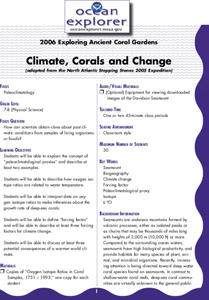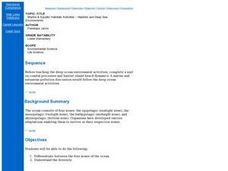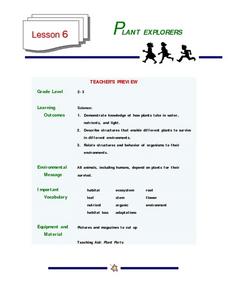NOAA
Climate, Corals and Change
Global warming isn't just an issue on land; deep ocean waters are also showing troubling signs. Young scientists learn more about deep water corals and the many recent discoveries researchers have made. Then they examine data related to...
NOAA
Watch the Screen!
Can a sponge cure cancer? Life science pupils visit the drugstore under the sea in the fifth activity of six. Working groups research the topic then get hands-on experience by testing the inhibiting effects of several plant extracts...
Curated OER
Invent an Insect
Explore biology by researching adaptation. First, learners research and define a list of insect vocabulary terms and discuss the benefits of each insect characteristic. They then utilize a worksheet to create their own insect and share...
Curated OER
Feeding in the Flow
The National Oceanic and Atmospheric Administration (NOAA) has developed a tremendous library of ocean-themed lessons that can be used in a variety of science settings. "Feeding in the Flow" is one of those activities; Its focus is on...
Curated OER
Habitats and Deep Sea Environments
Young scholars examine and identify the characteristics of the four zones of the ocean. They discover the amount of diversity in marine habitats. They also explore the adaptations organisms have that have allowed them to survive.
Curated OER
Plant Explorers
Students investigate how plants take in water, nutrients, and light. They create artwork showing how plants survive in different environments.
NOAA
It's a Roughy Life
Scientists recently discovered several previously unknown species at the Bear Seamount off the coast of New England. Scholars research these new species — benthopelagic, benthic, and seamount fish — and find out what makes them...
Ocean Explorer
Easy as Pi
Seamounts are large, extinct volcanoes that rise up from the bottom of the ocean floor. They are a relatively new landform in the scientific community, and this lesson plan invites students to learn about the amazing diversity of life...
Curated OER
Big Fleas Have Little Fleas
A benthic habitat hosts a vast collection of organisms and its structure influences the biodiversity. Middle-school marine biology explorers will discuss how corals impact structure, and therefore diversity, on the ocean floor. They draw...
Curated OER
No Escape
Via four student handouts, marine biology learners examine the topography and circulation cell of the Fieberilng guyot. Then they examine the number of individual hydroids counted at each depth. Pupils use the information to relate water...
Curated OER
A Piece of Cake
Students examine life under the sea to discover coral gardens and microhabitats. They demonstrate learning by creating an edible marine ecosystem with a sheet cake, icing, and different candies.
Curated OER
Cutt-Off Genes
Students explore how gene sequence analysis can be used to examine phylogenetic similarities of different organisms. Students work in groups to simulate a gel electrophoresis separation of fragments using poster board to create their gel.
Curated OER
Water Quality Monitoring
Students comprehend the four parameters of water quality. They perform tests for salinity, dissolved oxygen, pH and clarity or turbidity. Students comprehend why scientists and environmental managers monitor water uality and aquatic...












